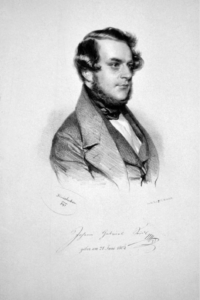Earthly happiness
(Poet's title: Irdisches Glück)
Set by Schubert:
D 866/4
[probably summer 1828]
Part of Vier Refrain Lieder, D 866
So mancher sieht mit finstrer Miene
Die weite Welt sich grollend an,
Des Lebens wunderbare Bühne
Liegt ihm vergebens aufgetan.
Da weiß ich besser mich zu nehmen,
Und fern, der Freude mich zu schämen,
Genieß ich froh den Augenblick:
Das ist denn doch gewiss ein Glück!
Um manches Herz hab ich geworben,
Doch währte mein Triumph nicht lang,
Denn Blödheit hat mir oft verdorben,
Was kaum mein Frohsinn mir errang.
Drum bin ich auch dem Netz entgangen:
Denn, weil kein Wahn mich hielt umfangen,
Kam ich von keinem auch zurück:
Und das ist doch gewiss ein Glück!
Kein Lorbeer grünte meiner Scheitel,
Mein Haupt umstrahlt’ kein Ehrenglanz;
Doch ist darum mein Tun nicht eitel:
Ein stiller Dank ist auch ein Kranz!
Wem, weit entfernt von kecken Flügen,
Des Tales stille Freuden g’nügen,
Dem bangt auch nie für sein Genick:
Und das ist doch gewiss ein Glück!
Und ruft der Bot’ aus jenen Reichen
Mir einst, wie allen, ernst und hohl,
Dann sag ich willig, im Entweichen,
Der schönen Erde: »Lebe wohl!«
Sei’s denn, so drücken doch am Ende
Die Hand mir treue Freundeshände,
So segnet doch mich Freundesblick:
Und das ist, Brüder, doch wohl Glück!
So many people look on with a grim expression
As they complain about the wide world,
Life’s miraculous stage
Lies in vain before them.
Yet I know better how to behave,
And far be it from me to be ashamed of joy,
I enjoy the moment with delight:
Surely that is something that counts as happiness.
I have attracted many a heart
Yet my triumph did not last long,
For silliness has often spoiled for me
What my cheerful attitude led me to attain.
I have therefore also escaped from the net;
Since, because no illusion held me hostage
I did not return to any of them:
And surely that is something that counts as happiness!
No laurels garlanded my locks,
No halo shone around my head;
Yet nevertheless what I have achieved is not in vain;
A quiet ‘thank you’ is also a garland!
To those who are far away from saucy flights
The quiet joys of the valley are sufficient,
Neither do they need to worry about saving their necks:
And surely that is something that counts as happiness!
And when the ambassador from those realms calls
One day, as he will for everyone, with a serious and cavernous voice,
Then I shall willingly say, as I leave,
To the beautiful earth, “Farewell!”
So let it be, since at the end we shall hold
Hands, faithful hands of friends will be held out to me,
And in this way I shall be blessed by the eyes of friends:
And that, brothers, is surely real happiness!
All translations into English that appear on this website, unless otherwise stated, are by Malcolm Wren. You are free to use them on condition that you acknowledge Malcolm Wren as the translator and schubertsong.uk as the source. Unless otherwise stated, the comments and essays that appear after the texts and translations are by Malcolm Wren and are © Copyright.
☙
Themes and images in this text:
Farewell and leave taking Friends Hands Hearts Joy Laurel Valleys Wreaths and garlands
There are a number of ways of distinguishing different types of happiness. Aristotle, in the Nicomachaean Ethics, made a distinction between ‘hedonic’ happiness (feelings of pleasure and enjoyment) and ‘eudaemonia’ (the fulfilment that comes from living a virtuous life). Many theologians have insisted that ‘earthly pleasures’ cannot compare with ‘heavenly bliss’. Liberals (such as Jefferson) have valued ‘the pursuit of happiness’ over ‘happiness’ itself, since it should be left up to each individual to decide what counts as happiness for them.
The speaker in Seidl’s poem is insistent that some of the most ordinary aspects of life should be accepted as a type of happiness: momentary pleasures, being able to live without being ‘trapped’ by delusions about being in love, offering help but expecting nothing except a sincere ‘thank you’ in return, and above all the support and kindly regard of friends. How deliberate is it, though, that other dimensions (e.g. the aesthetic, the spiritual) seem to be missing from the list?
☙
Original Spelling Irdisches Glück So Mancher sieht mit finstrer Miene Die weite Welt sich grollend an, Des Lebens wunderbare Bühne Liegt ihm vergebens aufgethan. Da weiß ich besser mich zu nehmen, Und fern, der Freude mich zu schämen, Genieß' ich froh den Augenblick: Das ist denn doch gewiß ein Glück. Um manches Herz hab ich geworben, Doch währte mein Triumph nicht lang, Denn Blödheit hat mir oft verdorben, Was kaum mein Frohsinn mir errang. D'rum bin ich auch dem Netz entgangen; Denn, weil kein Wahn mich hielt umfangen, Kam ich von keinem auch zurück: Und das ist doch gewiß ein Glück! Kein Lorbeer grünte meiner Scheitel, Mein Haupt umstrahlt' kein Ehrenglanz; Doch ist darum mein Thun nicht eitel; Ein stiller Dank ist auch ein Kranz! Wem, weit entfernt von kecken Flügen, Des Thales stille Freuden g'nügen, Dem bangt auch nie für sein Genick: Und das ist doch gewiß ein Glück! Und ruft der Bot' aus jenen Reichen Mir einst, wie Allen, ernst und hohl, Dann sag ich willig, im Entweichen, Der schönen Erde »Lebe wohl!« Sei's denn, so drücken doch am Ende Die Hand mir treue Freundeshände, So segnet doch mich Freundesblick: Und das ist, Brüder, doch wohl Glück!
Note: Schubert received Seidl’s poem in handwritten form. Seidl issued it later in a revised form in the newspaper Der Wanderer, but did not include it in his poetry editions.


